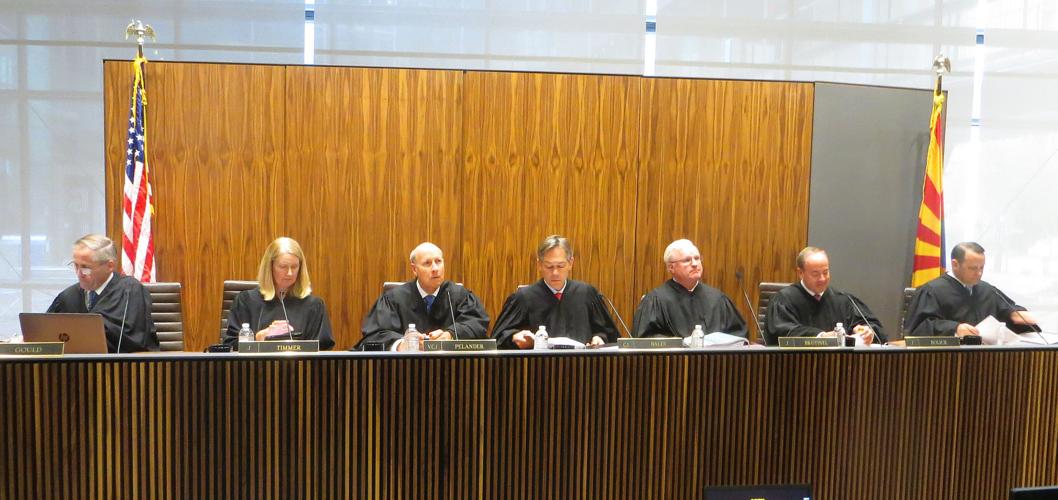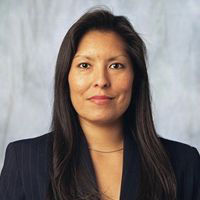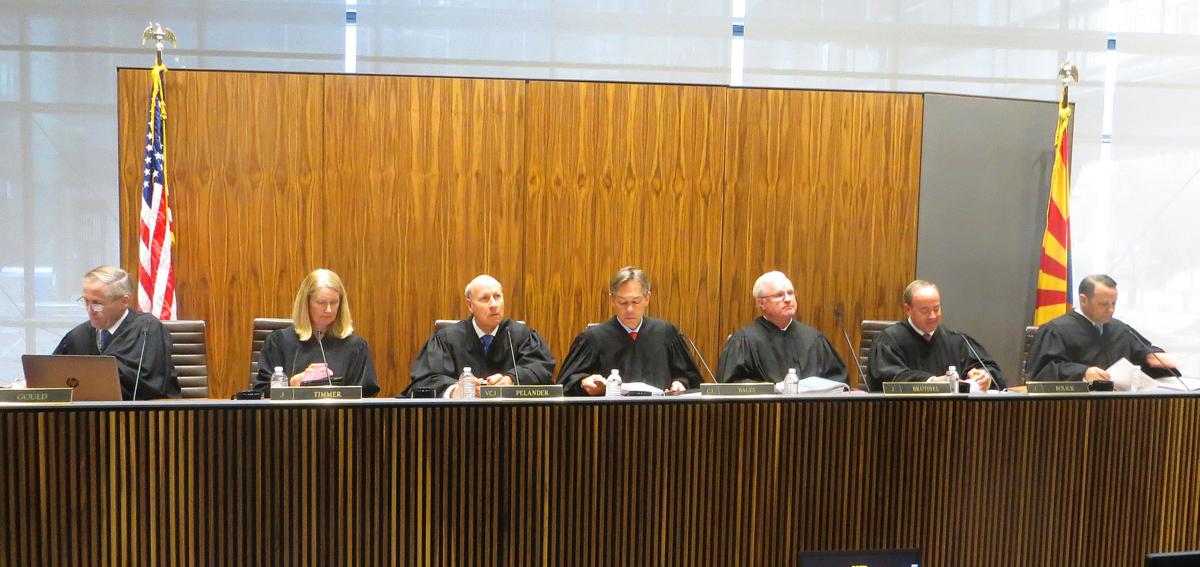PHOENIX — The Arizona Supreme Court late Tuesday threw out the bid by the head of the state Republican Party to void the results of the presidential race.
In a unanimous ruling, the justices said that party Chairwoman Kelli Ward failed to present any evidence of misconduct or illegal votes in the tally that found Joe Biden outpolled President Trump in Arizona.
Chief Justice Robert Brutinel, writing for the court, said Ward, who has the burden of proof when challenging an election, provided no evidence that the electors pledged to Trump got more votes than those pledged to Biden, “let alone (to) establish any degree of fraud or a sufficient error rate that would undermine the certainty of the election results.”
Brutinel acknowledged, as did the trial judge, that there were some errors made when damaged or ballots with extra marks had to be redone by hand so they could be fed through counting machines.
But he said a random check of 1,626 of these ballots ordered by the trial court found an error rate of as little as 0.37% or as much 0.55%.
Extrapolating that out to the 27,869 ballots that had to be duplicated, Brutinel said it would have gained Trump just 103 votes or, at best, 153 votes, “neither of which is sufficient to call the election results into question.”
Biden won in Arizona by more than 10,000 votes.
The justices also rejected claims that signatures on mail-in ballots did not match. They noted that a sample of 100 signatures was reviewed by forgery experts “but neither could identify any sign of forgery or simulation and neither could provide any basis to reject the signatures.”
Tuesday’s ruling does not end the legal fight.
Separately, a federal judge hearing a different case on Tuesday questioned her legal ability to overturn the results of the election.
“The election results were already certified,” noted U.S. District Judge Diane Humetewa. “The governor has already transmitted the same to the United States archivist.”
Humetewa also said federal courts in other states have thrown out nearly identical lawsuits seeking an order to decertify their results. She said they found no federal law being violated that would give them the ability to issue such an order.
“What makes this different?” she asked attorney Julia Haller, who is representing the 11 would-be Republican electors in Arizona who filed suit, seeking such an order here.
The Downtown Links Project in Tucson will be a 4-lane road that parallels the Union Pacific Railroad and connects Barraza-Aviation Parkway at Broadway Road to Interstate 10 via St. Mary's Road. The expected completion date is early 2023. Video by: Mamta Popat / Arizona Daily Star (2020)
Haller said federal courts can review state election matters. And as to timing, she said the 2000 U.S. Supreme Court ruling in the Florida election contest between George W. Bush and Al Gore was decided after that state certified its results.
But the heart of Haller’s arguments Tuesday came down to what she said is the weight of evidence that something went wrong, not just here but in other states where she has gone to court.
“We have seen that a combination of individual anecdotal evidence, together with statistical proof, is the standard to show when broader remedial relief is justified,” she told the judge.
That argument was disputed by attorney Justin Nelson, representing the secretary of state and the governor.
He told Humetewa there are a host of legal problems with the claim that Haller filed, including whether federal courts have jurisdiction over alleged violations of Arizona election law.
The bottom line, he said, is that the challengers are not entitled to have a federal court set aside the election.
“The courts cannot turn the clock back and create a world in which the 2020 election results are not certified,” Nelson argued.
He also said the lawsuit has an ulterior motive.
“This case is an attempt to undermine our confidence in the system with no basis in law or fact,” Nelson said. “They are using the federal court system in an attempt to undermine the rule of law and obtain breathtaking, startling and unprecedented relief to overturn the will of the people.”
Haller is trying to keep the case alive so she can present what she called “concrete evidence of widespread voter fraud.”
Much of that is based on complaints about Dominion Voting Systems software and equipment used in Maricopa County.
She said there is mathematical evidence of an “injection” of votes for Biden at specific times on election night. Haller said Dominion, a company challengers have said has ties to foreign countries and staffers who are hostile to President Trump, uses an algorithm to tally votes rather than actual votes, all of which she claims provided artificial support for Biden.
Nelson, however, said claims about how Dominion is operated and even whether it sends data out of the country are irrelevant as there is no hard evidence showing any actual fraud occurred in Arizona.
He also noted that a random hand count of ballots — the actual papers filled out by voters — meshed 100% with what the machines recorded.
Haller said her evidence goes beyond that, including a claim that more than 86,000 early ballots were returned by people but never recorded.
That number, however, is based on a phone survey of voters done by someone retained by the Trump campaign who asked people whether they sent in their ballot. The estimate comes from extrapolating out what that survey concluded.
That is highly unreliable, Nelson argues.
For example, he said it could include people who didn’t get their ballots in the mail on time. He also said the survey, conducted two weeks after the election, might have included people who “lied or misremembered.”
Moreover, the survey doesn’t suggest that such missing ballots would have favored Trump.
Haller has other allegations, including nearly 220,000 other votes she claims were fraudulently recorded for voters who, using that same telephone survey methodology, claimed they never requested mail-in ballots.
If Humetewa does not immediately dismiss the case on legal grounds, she has agreed to allow Haller to present whatever evidence she has at a hearing on Thursday, Dec. 10.
Photos: Tucson's Winterhaven Festival of Lights through the years
Winterhaven Festival of Lights
Updated
Winterhaven Festival of Lights in Tucson in December, 1964. Time exposure at Christmas Ave. and McKenzie St.
Winterhaven Festival of Lights
Updated
Winterhaven Festival of Lights in Tucson in December, 1964.
Winterhaven Festival of Lights
Updated
Winterhaven Festival of Lights in Tucson in December, 1964.
Winterhaven Festival of Lights
Updated
Winterhaven Festival of Lights in Tucson in December, 1964.
Winterhaven Festival of Lights
Updated
Winterhaven Festival of Lights in Tucson in December, 1966.
Winterhaven Festival of Lights
Updated
Time exposure of Luminaria Lane in the Winterhaven subdivision in Tucson in December, 1961. Residents along Greenlee Road and Stewart Avenue placed hundreds of traditional Mexican luminarias around their homes.
Winterhaven Festival of Lights
Updated
Winterhaven Festival of Lights in Tucson in December, 1966.
Winterhaven Festival of Lights
Updated
Winterhaven Festival of Lights in Tucson in December, 1966.
Winterhaven Festival of Lights
Updated
Winterhaven Festival of Lights in Tucson in December, 1966.
Winterhaven Festival of Lights
Updated
Winterhaven Festival of Lights in Tucson in December, 1968.
Winterhaven Festival of Lights
Updated
Winterhaven Festival of Lights in Tucson in December, 1971.
Winterhaven Festival of Lights
Updated
Winterhaven Festival of Lights in Tucson in December, 1971.
Winterhaven Festival of Lights
Updated
Winterhaven Festival of Lights in Tucson in December, 1971.
Winterhaven Festival of Lights
Updated
Winterhaven Festival of Lights in Tucson in December, 1971.
Winterhaven Festival of Lights
Updated
Winterhaven Festival of Lights in Tucson in December, 1971.
Winterhaven Festival of Lights
Updated
A single vehicle drives through the Winterhaven neighborhood in Tucson on Christmas Eve, 1956.
Winterhaven Festival of Lights
Updated
Entrance to the Winterhaven Festival of Lights in Tucson in December, 1971.
Winterhaven Festival of Lights
Updated
Winterhaven Festival of Lights in Tucson in 1968.
Winterhaven Festival of Lights
Updated
Winterhaven Festival of Lights in Tucson in December, 1972.
Winterhaven Festival of Lights
Updated
Winterhaven Festival of Lights in Tucson in December, 1972.
Winterhaven Festival of Lights
Updated
Winterhaven Festival of Lights in Tucson in December, 1972.
Winterhaven Festival of Lights
Updated
Winterhaven Festival of Lights in Tucson in December, 1974.
Winterhaven Festival of Lights
Updated
Winterhaven Festival of Lights in Tucson in December, 1974.
Winterhaven Festival of Lights
Updated
Winterhaven Festival of Lights in Tucson in December, 1974.
Winterhaven Festival of Lights
Updated
Winterhaven Festival of Lights in Tucson in December, 1964. Time exposure at Christmas Ave. and McKenzie St.







